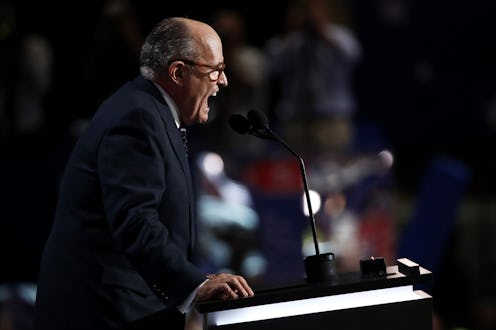News
This Is Much More Important Than Melania's Speech
Melania Trump's allegedly plagiarized speech from the first night of the Republican National Convention dominated the political conversation across social media Tuesday. Plagiarism is no doubt a serious issue, but whether or not Trump copied parts of Michelle Obama's 2008 speech at the Democratic National Convention is far from the most important issue concerning the RNC's first day — the primary goal of which was to "Make America Fear Again."
The over-the-top campaign, billed as "Make America Safe Again," made use of both personal anecdotes and explosive rhetoric to fan the flames. We saw intensely emotional and enraged speeches from the loved ones of people killed by immigrants in the country illegally. And Republican lawmakers took to the stage to emphasize security threats both domestic and foreign, from "Islamic terrorists" to neighborhood crime. The narrative that emerged is that America is under constant attack from foreigners both within and beyond its borders, that we can all expect to die in a fiery hellscape if Hillary Clinton is president, and that only Trump can make us safe again.
This narrative needs to be challenged. And doing so is far more urgent than challenging the authenticity of Melania Trump's speech.
The stories presented by bereaved family members of those killed by undocumented immigrants are tragic and upsetting. But the narrative the anecdotes seek to build doesn't stand up to the broader context of facts across the country. Research compiled by the American Immigration Council concludes, over and over, that immigrants (both documented and undocumented) are significantly less likely to commit crimes, including violent crimes, than native-born Americans.
Yet Trump, and those who agree with his "tough talk" on immigration, insist that undocumented ("illegal") immigrants are dangerous, representing some kind of special, heightened threat to our safety. As Trump told CNN's Don Lemon recently: "If you look at the statistics ... on rape, on crime, on everything, coming in illegally to the country, they're mind-boggling." But what is truly mind-boggling is that there are no such statistics. What is truly mind-boggling is that Trump used the emotional personal stories of bereaved individuals to put anger and fear front and center on the Republican National Convention stage in place of facts.
But the evening's fear campaign wasn't only about the "enemies" from south of the border. Candidate for the Senate Darryl Glenn spoke of a general trend of increasing violence in America, saying to President Obama, "neighborhoods have become more violent under your watch." But most of them haven't — crime rates have steadily declined over the past several decades, and violent crime was at a record low since the 1970s in 2014. In general, neighborhoods have become safer.
And of course, there are the terrorists. Speaker after speaker, from celebrities to bereaved family members to lawmakers, emphasized the immediate and immense threat radical Islamic terrorism supposedly poses to Americans, how Hillary Clinton couldn't possibly protect us because she won't say its name (even though she did in fact refer to "Islamic" terrorism in June, as if this actually means anything), and that we need Trump's toughness to kill the terrorists, to get 'em. One speaker, a member of the security team on the scene during the Benghazi attack, chillingly compared shooting one enemy after another in the head to "Whack-a-Mole," to applause.
You'd be hard-pressed to find anyone who will say that terrorism isn't really a problem, but generally, we have lost perspective on the scope of the threat. As The New York Times reported, right-wing terrorist acts are far more prevalent in the United States than those committed in the name of Islam. Fears of terrorism increased dramatically after 9/11, and that's understandable. But we would do well to keep in mind that, according to data compiled by the Heritage Foundation, just over half of Americans who died in terrorist attacks in the four decades between 1969 and 2009 died on 9/11. It was a highly anomalous day, and since then, Americans have been as likely to die in a furniture accident as from terrorism.
The first day of the RNC certainly struck fear in me — not of Mexicans or Muslims, but of the power of fear, unbridled by facts, to impact people's beliefs. And that's a much more important topic than SpeechGate.
